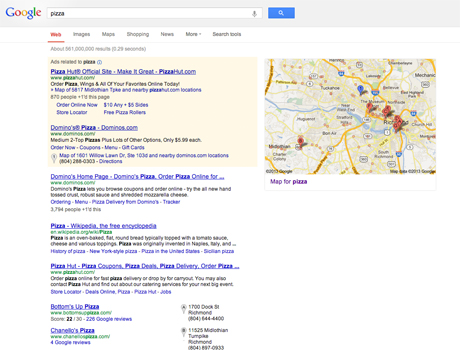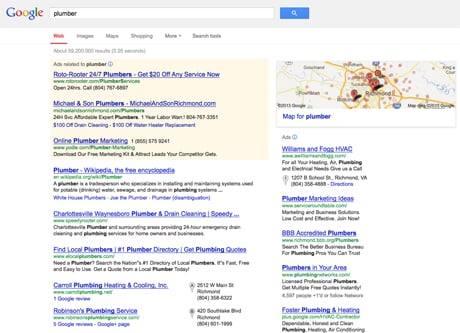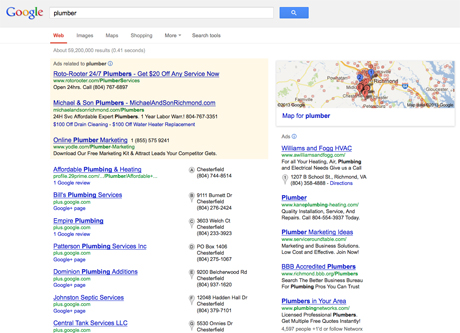When hiring an online marketing company, it's important to set goals. You want to have something to work toward, and you want to be able to hold your online marketing team accountable.
But, as you're setting your goals, be careful not to make this mistake: asking, "Can you guarantee that you'll make my website #1 on Google?"
A request like this is problematic for several reasons.
You simply cannot promise a specific position in search results.
Google has said pointblank that no one can promise you a certain spot, much less the #1 spot, in search engine rankings:
No one can guarantee a #1 ranking on Google.
Beware of SEOs that claim to guarantee rankings, allege a “special relationship” with Google, or advertise a “priority submit” to Google.
If an online marketing company makes these (or similar) claims, that company is being dishonest—and that should be a big red flag.
“Guaranteed to be #1 on Google” is a guarantee for shady SEO practices.
If an online marketing firm promises the top spot in search results, they might deliver on their promise.
But, they’ll likely get you to #1 without really caring about what keywords are targeted or how those rankings are achieved.
Deceptive practices for guaranteeing a #1 rank might include:
Targeting obscure phrases that generate little to no website traffic
So, the online marketing firm promised they’d make you #1 on Google. However, they didn’t necessarily say you’d be #1 for relevant keyword phrases.
An online marketing firm can quickly get you to the top by targeting phrases that are very long, very strange, and/or don’t get a lot of search traffic—i.e., by going after keyword phrases that aren’t very competitive.
Say you’re a plumbing company that’s trying to improve its search rankings. Your SEO provider has you showing up #1, all right—for a phrase like “fixing the left handle on the sink in the guest bathroom.” A phrase that isn’t very likely to bring very many new visitors to your website.
Employing “black hat” SEO techniques
Alternatively, the SEO provider might use unethical tactics to get you to the top of search engines. These “black hat” methods could be:
- Buying or trading links with low quality websites that are not relevant to your niche. You might hear these referred to as "link exchanges."
- Overusing your targeted keyword on your website, to the point that content sounds unnatural and spammy.
- Mass-producing low quality articles, changing the wording ever so slightly, and then mass-distributing said articles on a number of directories.
Techniques like these just might get you a #1 ranking. But that achievement will be short-lived. Search engines are taking more and more steps to combat spam. Google’s most recent algorithm updates have been especially tough on low quality content.
Black hat SEO techniques are also a recipe for getting your website banned from Google. Look no further than retailer J.C. Penney. After JCP’s deceptive link-building scheme was exposed, Google quickly dropped jcpenney.com from search results. They recovered, but it took some time and significant effort (and cost).
Rankings are fickle.
Positions in search results naturally fluctuate. You could be #1 today, #3 tomorrow, and back to #1 the day after that.
Does that mean your website broke or somehow failed you on the second day? Nope! Your website is behaving normally.
Obsessing over a #1 ranking opens the door to obsessing over everyday minutia that’s doesn’t accurately reflect your website’s performance.
Search results and rankings mean different things to different people.
Search results pages are becoming more and more complex, and they can show anything from blog articles to images to videos to maps.

This search on Google for pizza includes results for ads (paid, or PPC, listings), organic (unpaid) listings and Google+ Local pages, as well as a Google Map.
Being in that coveted #1 spot isn't a clear-cut, black-and-white issue. Do you want to improve your position in paid search results? Do you want to make sure that your local business listing shows up first? Perhaps you'd like to improve your position within unpaid search results.
You have to ask yourself what “being #1” means to you.
Search results and rankings look like different things for different people.
With the increasing personalization of results, Google returns different sets of results based on factors like a person's browsing history or their geographic location.

Search results for "plumber", with location in Google Chrome set to "Richmond VA"

Search results for "plumber", with location in Google Chrome set to "Chesterfield VA"
In our example here, searching for "plumber" on Google yields different results based on the city you're in.
There is no longer a definitive #1 for a given search phrase.
Being #1 is only the beginning of the story.
Similar to website visits and vanity metrics, search engine ranking doesn’t paint the full picture of your website’s performance or your online marketing’s effectiveness.
Sure, you show up #1 on Google. But...
- Does a top position drive qualified visitors to your website?
- Does your website generate enough leads?
- Is your website optimized enough to make the most of the visitors it gets?
Back in 2006, we did a website evaluation for a cartoonist. And a darn good cartoonist he was. At the time, he had a top ranking for a very popular keyword, and worked hard to get it. What we found, though, is that he needed nearly 1,000 visitors to get one person to buy a cartoon. He should have been getting 3-5 sales per 100 visitors. Turns out that his website was optimized for "free cartoons," a phrase that had a very low purchase intent.
You can't zero in on rankings alone. You have to take a holistic, "big picture" view of your online marketing and make sure you're evaluating the metrics that really matter and truly show how your website impacts your business.
The lesson?
It can be easy to get caught up chasing the dream of "being #1 on Google." At first, it sounds important and rewarding. But, there isn't really such a thing as "being #1," and there's no way to guarantee a particular result. Search engine marketing is evolving, and involves much more than tracking a position on a results page. You have to make sure that you're relevant; that you use ethical techniques; and that you have a strategy in place that capitalizes on all avenues of online marketing (paid search, local listings, blogs, and so forth).
Here are some pro tips to consider instead of chasing that #1 position:
- Use Google Adwords (search engine ads) to bid on terms you think you might want to optimize your website for. Only optimize for the ones that get the best clickthrough rates or the phrases that actually get customers to call or contact you.
- Set up social media profiles and a blog so that when someone searches for your company name, your company occupies all of the listings on the page.
- Evaluate your homepage, putting yourself in your customers' shoes. Are you making any of these 5 head-smacking marketing mistakes? If so, fix them!
Showing up well on Google starts with a sound online marketing strategy, including careful analysis of your business goals, thorough research, and outlining ethical techniques that will get the leads you want while providing visitors with the best experience possible. Want to learn more about how to optimize your website for better search visibility and more leads? Request a free inbound marketing assessment!









